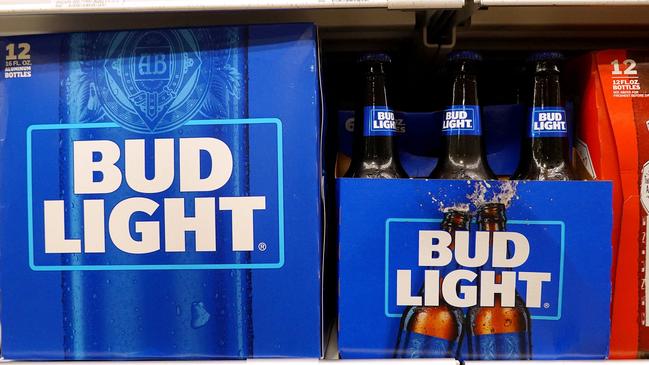The Bud Light boycott was just the beginning of a crazy year for beer
US beer shipments for 2023 are expected to reach their lowest level in a quarter-century.

Beer had a rough year.
A Bud Light boycott in 2023 reshuffled the beer industry, vaulting Modelo Especial to the top spot in America. At the same time, many people simply stopped drinking beer altogether.
US beer shipments fell more than 5 per cent in the first nine months of the year and by year’s end are expected to hit their lowest level in a quarter-century, according to industry tracker Beer Marketer’s Insights.
“This is an industry-wide, five-alarm fire,” Craig Purser, president of the National Beer Wholesalers Association, said in a speech to wholesalers at a convention in October.
Consumer tastes are shifting. Over the past decade, the craft beer boom peaked, then the hard seltzer craze peaked. Now people are reaching for non-alcoholic beers and canned cocktails. And there is a generational shift happening: Younger adults drink less alcohol than older consumers, and prefer spirits to beer.
In a survey released this fall by data firm MRI-Simmons, Generation Z had the lowest alcohol consumption of any adult age group in the US, with 58 per cent of legal drinking-age respondents saying they had drunk alcohol in the past six months. Among those, 87 per cent had consumed spirits while 56 per cent had consumed beer.
Beyond that, drinkers of many ages are moving away from alcohol generally — or beer specifically — for health reasons such as losing weight.
Jen Vare, a 46-year-old Miller Lite drinker in Conshohocken, Pa., decided earlier this year that she might need to break up with beer. She had experienced a hard time hitting personal weight-loss goals for years, and a friend encouraged her to try ditching brews. So she tried it, along with WeightWatchers and avoiding the candy dish at work. She lost 37 pounds in 27 weeks.
“We joked and said it was going to be the vodka diet and here we are,” Vare said. “I haven’t cut it completely out of my life but I do feel better now.”
Cannabis is another factor in beer’s decline. In states that have legalised recreational or medicinal marijuana, some consumers are shifting from alcohol to cannabis, according to TD Cowen analyst Vivien Azer.
Legal cannabis sales in the US were estimated at $29bn in 2023. TD Cowen projects that the category will gain 18 million users over the next five years while alcohol could lose 2 million.
These changes in Americans’ relationship with beer were already damping brewers’ sales before an April Instagram post by a transgender influencer sparked a firestorm around Bud Light and turned the US beer industry upside down.
Bud Light’s sales plummeted and still haven’t recovered. In the four weeks ended December 9, Bud Light’s retail-store sales were down 28 per cent compared with the same period last year, according to Nielsen data analysed by consulting firm Bump Williams. The brand’s brewer, Anheuser-Busch InBev, has been trying to mount a comeback with marketing that features current and former National Football League stars. Bud Light’s independent distributors, meanwhile, are trying to diversify their offerings with premium bottled waters, energy drinks and pretzels.
“We’re all scrambling,” one distributor said.
Modelo Especial, a Mexican import sold by Constellation Brands, overtook Bud Light in 2023 as the top-selling US beer by dollar sales in retail stores. Bud Light remains the top US beer by volume.
Other brands climbed, too, including Yuengling and Pabst Blue Ribbon. Sales volume for Molson Coors, which makes Coors Light and Miller Lite, rose for the first time in 15 years.
Concerns about the industry’s overall health are misplaced, a Molson Coors spokesman said: “It’s not so much a beer problem as it is a Bud Light problem.”
One big question is what will happen after the anniversary of influencer Dylan Mulvaney’s April 1 Instagram post, said Bump Williams, who runs the eponymous consulting firm. Will sales of brands like Coors Light and Modelo continue to surge, he asked, or will they revert to their trends before the boycott?
Much of that could hinge on the spring shelf resets, when retailers change their allocation of shelf space according to what’s selling — and what’s not.
Constellation and Molson Coors are expected to gain the most shelf space in the spring resets and Anheuser-Busch is expected to lose the most, according to a recent survey by Goldman Sachs of about 37,000 convenience stores.
One bright spot for the beer category, aside from the growth in non-alcoholic beers, is growing consumer interest in full-flavoured malt beverages like Constellation’s Modelo Chelada and Boston Beer’s Twisted Tea.
Modelo Chelada, a canned beer cocktail, appeals to more female and younger consumers than traditional beer, Constellation said.
Anheuser-Busch, which also sells Michelob Ultra, Stella Artois and Cutwater canned cocktails, said it is confident in the beer industry and noted that while US beer shipments declined, dollar sales of beer rose. The company remains America’s largest brewer.
“For 2024, we will continue to focus on what we do best — brewing great beer for everyone and earning our place in the moments that matter,” an Anheuser-Busch spokeswoman said.
The Wall Street Journal



To join the conversation, please log in. Don't have an account? Register
Join the conversation, you are commenting as Logout